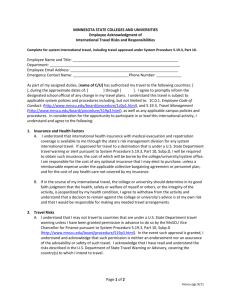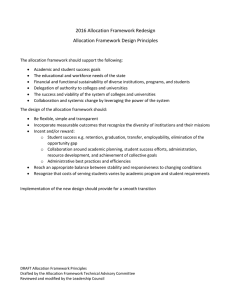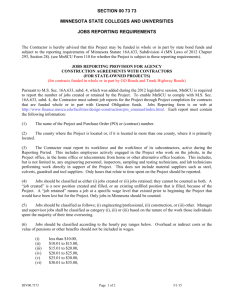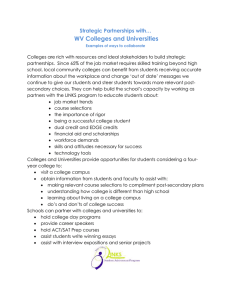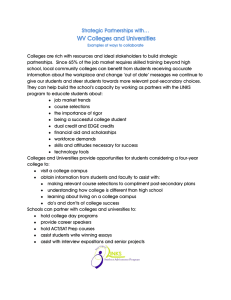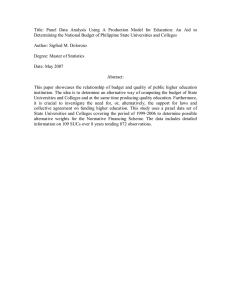Minnesota State Colleges and Universities August 20, 2012 ... by Laura M. King,
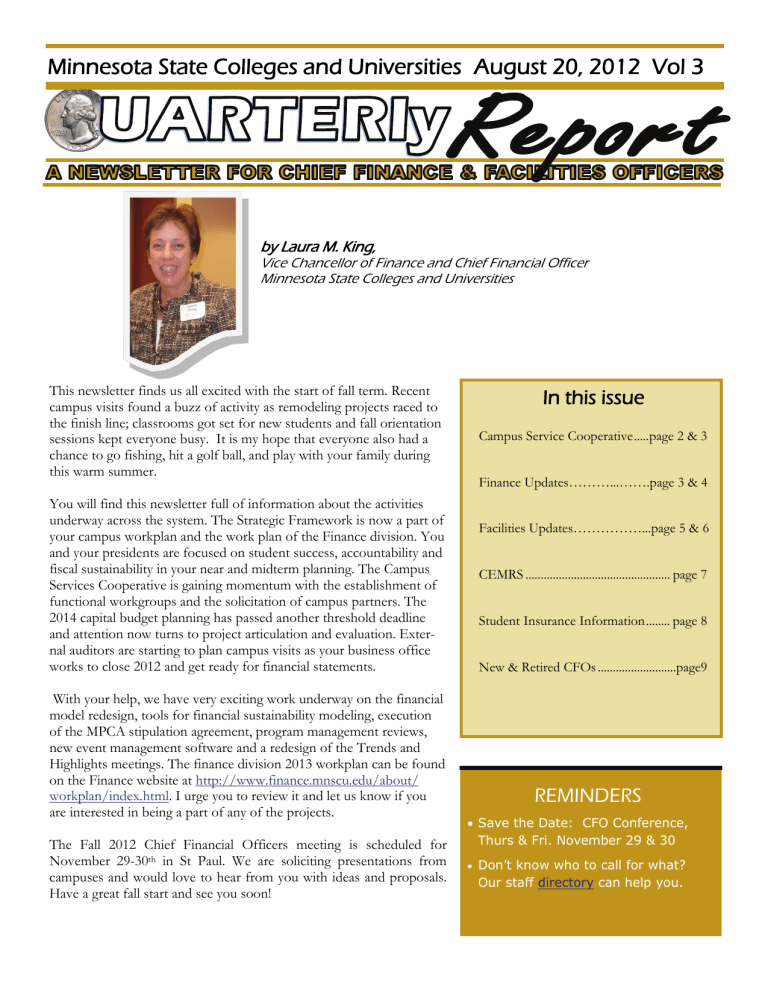
Minnesota State Colleges and Universities August 20, 2012 Vol 3 by Laura M. King,
Vice Chancellor of Finance and Chief Financial Officer
Minnesota State Colleges and Universities
This newsletter finds us all excited with the start of fall term. Recent campus visits found a buzz of activity as remodeling projects raced to the finish line; classrooms got set for new students and fall orientation sessions kept everyone busy. It is my hope that everyone also had a chance to go fishing, hit a golf ball, and play with your family during this warm summer.
You will find this newsletter full of information about the activities underway across the system. The Strategic Framework is now a part of your campus workplan and the work plan of the Finance division. You and your presidents are focused on student success, accountability and fiscal sustainability in your near and midterm planning. The Campus
Services Cooperative is gaining momentum with the establishment of functional workgroups and the solicitation of campus partners. The
2014 capital budget planning has passed another threshold deadline and attention now turns to project articulation and evaluation. External auditors are starting to plan campus visits as your business office works to close 2012 and get ready for financial statements.
With your help, we have very exciting work underway on the financial model redesign, tools for financial sustainability modeling, execution of the MPCA stipulation agreement, program management reviews, new event management software and a redesign of the Trends and
Highlights meetings. The finance division 2013 workplan can be found on the Finance website at http://www.finance.mnscu.edu/about/ workplan/index.html
. I urge you to review it and let us know if you are interested in being a part of any of the projects.
The Fall 2012 Chief Financial Officers meeting is scheduled for
November 29-30 th in St Paul. We are soliciting presentations from campuses and would love to hear from you with ideas and proposals.
Have a great fall start and see you soon!
In this issue
Campus Service Cooperative ..... page 2 & 3
Finance Updates………...…….page 3 & 4
Facilities Updates……………...page 5 & 6
CEMRS ................................................ page 7
Student Insurance Information ........ page 8
New & Retired CFOs .......................... page9
REMINDERS
Save the Date: CFO Conference,
Thurs & Fri. November 29 & 30
Don’t know who to call for what?
Our staff directory can help you.
Campus Service Cooperative August 20, 2012 Page 2
The Campus Service Cooperative (CSC) is celebrating its first year anniversary at Harmon Place on the MCTC campus.
The CSC continues to develop and execute its mission to “focus on efficient, high quality, and transformational delivery of services, while respecting the distinct educational mission of each college and university.” To help MnSCU develop a comprehensive framework and shared services plan, the CSC will enlist the help of project management resources. Together with input from the campuses, the CSC will develop common practices and ways to work together in human resources, financial aid, and finance, and strategic sourcing.
The CSC has also been hard at work expanding its current operations with partner colleges and universities around areas such as payroll, accounts payable, reconciliation processes, and a business office collaboration initiative all in an effort to deliver savings, greater compliance, and better value.
The CSC is now processing payroll for six colleges, the system office, and all presidents. We soon will be adding another campus. The CSC will then be processing one of every five employees’ payroll.
We are excited about the growing momentum and interest from campuses about working with the CSC. Stay tuned for more information about additional project management resources coming on board to help us prepare comprehensive plans for strategic sourcing, finance, human resources, and financial aid processing.
Financial Aid
Progress toward more processing of financial aid through the CSC is continuing –
Minnesota State Community and Technical College has begun processing Direct Loans for Fond du Lac Tribal and
Community College.
Southwest Minnesota State University has completed an informal program review of financial aid processing and policies at Hennepin Technical College, rendering assistance in assessing and preventing risk of non-compliance with federal and state financial aid rules. The University has provided us with an example of school-to-school cooperative assistance that we can apply whenever we have significant staff turnover in an institutional financial aid office.
Three schools are piloting a new post-graduation financial aid/loan repayment counseling product and two schools are piloting a prospective student financial aid planning product; both of which could enable cooperative assistance to schools in performing required Student Loan Entrance and Exit Counseling.
We continue working on identifying schools to “pair up”; where each school will provide reciprocal processing – each assuming responsibility for a process performed for both schools.
The CSC is gathering more and more momentum in our institutional financial aid offices, to the point that we are working to find activities for all of our volunteers. A scheduled “process mapping” effort will help us to identify best practices and/ or common practices and will greatly facilitate the continued growth of financial aid within the CSC.
“I think it’s exciting for our system to be out in the lead as schools and systems across the country work to find simpler, more efficient ways to do business. We have a gigantic opportunity to shape the future of Minnesota and to improve the experience of our students and the Campus Services Cooperative is gathering more and more momentum in our institutional financial aid offices” ~ Chris Halling, System Director for Financial Aid
Human Resources
Many conversations about cooperative services in Human Resources are taking place throughout the system. The CHROs have identified five priorities for applying a cooperative services model to the work of HR. These areas are:
Retirement Processing and Reporting
HR Transactions
Investigations
Mandatory Training
Unclassified Recruitment
Through the spring, work groups assigned to each of these five areas developed scoping and anticipated return on investment reports for each. The groups will continue their work in tandem with the CSC consultancy taking place in summer
2012.
“Our progress in cooperative services in Human Resources in fiscal year 2012 highlights a culture shift that is well underway. Cooperative services has become a go-to solution and a vehicle for innovation and collaboration. It is the framework for planning and imagining the future of human resources in the MnSCU system.” ~ Heather Kidd, System Director for HRIS
CSC Cont. August 20, 2012 Page 3
Strategic Partnerships
Campus Service Cooperative representatives have been meeting with campus and business leaders, legislators, private colleges, University of Minnesota, MN Department of Administration officials, and other cooperatives.
The purpose for these meetings has been to listen to and share ideas on how to become more efficient and further collaborate with each other. Colleges and universities have included language which allows other MnSCU institutions to use their contracts. Bemidji State University, Century College, and St. Cloud State University have included language in their RFPs that allow all campuses to use their good work on certain contracts. Collaborative Sourcing Team master contracts have not only provided excellent value but have reduced bidding/contracting burdens for each campus. Recent master contract work includes Xerox, U.S. Energy, Hobsons, ImageNow and a renewed contract for mattresses with Upper Midwest Sleep.
We have over ten strategic partners’ contracts that we have used to reduce financial burdens and lighten the work load. Colleges and universities have realized tremendous value from conducting sourcing once for all colleges/universities as well as collaborating with outside partners and participating in joint contracts. Much progress has been made but there is a lot more that can be done. Internal and external strategic partnerships continue to be keys to success.
Finance Updates
Financial Reporting Update
Fiscal Year 2012 financial statement preparation has begun. Annual instructions have been sent to the colleges and university financial reporting contacts and posted on SharePoint. A list of financial reporting contacts is also posted there. A kick off meeting was held in June with the three audit firms, legislative auditors, internal auditors and finance staff.
The college and university Internal Control Documentation cycles should be uploaded to the SharePoint project site prior to a scheduled audit. Audit firms will be reviewing these cycles as part of their audit work in the upcoming weeks.
CFI Modeling
A new CFI modeling tool has been in development and tested by a small group of participant institutions. The tool allows for easy modeling of various financial scenarios and shows their impact on a school’s future years CFI. The tool is intended to help schools determine how a particular type of capital project (whether financed from operations, with general obligation bonds, or revenue bonds) will affect future years CFI. Operating assumptions such as changes to tuition, salaries, etc. are also built into the model. The tool is available to all institutions on SharePoint. Please contact Gina Hochsprung if you have any questions at (651) 201-1733.
Fundware Replacement
Financial reporting and the IT department have begun working on a new ISRS accrual module that will be tested in early
2013. This module will replace our current financial reporting software (Fundware) that is currently in use by all of the 13 audited colleges and universities and the system office. Stay tuned for additional updates.
Finance User Group Update
The Finance User Group (FUG) met on July 10, 2012, at the Quarry Center facility in Waite Park. The FUG received updates on the IT and Finance Development teams’ workplan as well as projects such as the Equipment Module Redesign and the Department of Revenue Collections Interface. Other topics included discussions on the impact of systemwide holds, tuition differential coding, and system procedure 7.3.3 on purchasing cards.
Finance Updates August 20, 2012 Page 4
2014-15 Biennial Budget
Development of the 2014-15 financial outlook and biennial budget legislative request is underway. MnSCU’s budget request will build upon the strategic framework and support the efforts currently underway to implement the framework.
The specific details of the budget request are still in the formative stages, with plans to discuss the budget proposal with
Leadership Council in September. The Board of Trustees is scheduled to discuss the proposal at both its October and
November meetings. MnSCU’s budget request will be included in the governor’s budget which will be submitted to the legislature on January 22, 2013.
While the economic climate has improved over the past year, the state is still facing substantial budget challenges: The current projected deficit for the FY2014-15 biennium is $1.1 billion, which increases to over $4 billion when inflation and the K-12 shift buy-back are taken into account. Minnesota Management and Budget (MMB) will update its budget forecast in November, and this forecast will set the stage for the 2014-15 budget discussions. Go to http://www.mmb.state.mn.us/ fin/fu for the latest information on the state’s financial outlook.
In addition, there will be a new look and feel to the biennial budget document this year. MMB has modified the budget format with the goal of creating a clear and concise document that focuses on performance. This will also be the first budget produced with the new statewide budget system—Budget Planning and Analysis System.
Financial Framework
Over the past several months, Chancellor Rosenstone and the Leadership Council have been engaged in conversation regarding MnSCU’s financial model. The discussion began in April with an examination of the current allocation model, followed by a discussion of the design principles in May. Most recently, the Leadership Council began considering possible changes to the financial model. Consideration is being given to the way systemwide services and the system office are funded, the allocation of funds for facilities and the relative weight of funding for instruction verses administration/student services in the allocation framework. Work on this initiative will continue over the next several months with the goal of finalizing changes in January 2013 for beginning stages of implementation in fiscal year 2014.
CFO participation in this initiative is welcome and encouraged. CFOs are urged to review the information and the issues with their president on a regular basis. Monthly conference calls will be scheduled to provide updates and obtain feedback and input. The Technical Advisory Committee will meet regularly and play an important role in developing specific changes to the allocation framework. Please direct questions and comments to Deb Bednarz ( Deborah.bednarz@so.mnscu.edu
) or
Susan Anderson ( Susan.Anderson@so.mnscu.edu
).
Tuition Study
As part of the Finance Division’s 2013 workplan, a tuition policy review will be undertaken. The purpose of the study is to provide an overview of MnSCU’s tuition and fee structure, policies, practices and trends, and to document the variations in those practices. This information will help form a discussion on tuition principles, policies, and strategies.
On a related issue, efforts are also underway to more easily identify tuition differential in ISRS. Currently, because of the way differential tuition is coded in ISRS, it is not possible to answer simple questions about differential tuition systemwide, such as: how much of our tuition dollars are generated from courses and programs that charge a differential rate? The Finance Users Group discussed this issue at their July meeting and work on this issue will continue. If you have ideas to share, please contact Ge Thao (ge.thao@so.mnscu.edu) or Nicole Blanchard (nicole.blanchard@so.mnscu.edu ).
PROJECT 2022
Work on a campus version of Project 2022 has begun with two test campuses–Saint Paul College and Winona State University. The first version of the tool was built using systemwide data which is now being updated using data at the institutional level. The end goal will be to have a tool that will be useful for creating accrual-based financial scenarios at the institution level and that can be used with the CFI modeling tool to help campuses with their financial planning. Work on the tool is being overseen by the Project 2022 Advisory Committee, composed of both financial and institutional research staff from colleges and universities. Recently, Dan Holtz from Ridgewater College and Doug Olney from Bemidji State University joined the committee. Please contact Deb Bednarz at deborah.bednarz@so.mnscu.edu
or Matt MacInnes at matt.macinnes@so.mnscu.edu
if you have any questions.
Facilities Update August 20, 2012 Page 5
Job Order Contracting
Job Order Contracting (JOC) is an alternate project delivery method for building construction work under $250,000 that can be used in lieu of traditional Design/Bid/Build. JOC will be a beneficial tool for many HEAPR and campus funded projects because it expedites bidding and contracting processes and it is based on pre-qualified contractors. Work is proceeding on schedule for implementing by January 1, 2013. Watch for more information in future newsletters, at Chief
Engineer’s Guild annual conference and on the facilities website .
Facilities Professional Technical Master Contracts
Facilities Professional Technical Master Contracts (PT MC) are used extensively by campuses for expediting selection and securing services of vendors under $100,000. The existing PT MCs were extended for 210 vendors and 20 new PT MC through June 30, 2013. The facilities unit is in the process of planning new PT MC that will be effective Spring
2013 that will provide overlap with existing master contracts. Based on feedback from campuses, we plan to improve vendor selection by separating out PT MC specialty services that will require meeting minimum qualifications for roof, window/door, construction testing, masonry, waterproofing, and industrial hygienists.
Project Management Review
Project Management Review (PMR)s began in December 2011 to provide an overview of active capital projects at our colleges and universities. To date, 19 colleges/universities have participated and the remaining reviews will take place by
December 2012. PMRs are beneficial in providing overview of the status and health of campus projects. By grouping institutions together for review, we are able to share issues/solutions and best practices. Another beneficial outcome is that review discussions identify “broken shovel” issues and the system office is able to redirect work to provide increased resources and assistance to address them. The second round of PMRs will begin January 2013 with expanded audiences and increased participation.
Capital Improvement Program Report
The Capital Improvement Program (CIP) report for January through June 2012 is available on facilities website . The CIP report is a summary of MnSCU’s active capital projects for G.O. Bond, HEAPR and Revenue Funds. It includes a funding source summary, financial history, and list of active projects in design or construction. Individual project summaries are at the end of the report and the format is identical to the Capital Improvement Project Summaries (CIPS). CIPS are updated monthly and available online.
Training the Team
It’s hard to believe, but the fall semester starts in less than a month. Many of you are busy bringing facility projects to conclusion, putting plans in place, and conducting faculty and staff training to be ready to welcome students back in a few short weeks. Just as educating students goes into full force this fall, so do opportunities for training the facilities team.
Here are a couple training opportunities.
Sept 5-6 – Minnesota State Chief Engineer’s Guild, Holiday Inn and Suites, St Cloud. Info at http://mnceg.org/.
Oct 2-3 – Safety & Loss Control Conference, presented by the Department of Administration’s Risk Management
Division, in cooperation with Minnesota State Colleges and Universities at Hennepin Technical College - Eden
Prairie Campus. MnSCU Contact: Don Beckering , 651-201-1790
Oct 13-17 – APPA Midwest Region Annual Meeting and Conference, Minneapolis . This event is also a practice run for the APPA National meeting and conference to be held in Minneapolis in 2014.
We encourage you to be involved in these opportunities. We will be presenting and/or participating at each of these. If there is something you would like to present or to see discussed or presented during these sessions, please contact Brian
Yolitz at 651-201-1777.
We look forward to seeing you at these opportunities or on campus.
Facilities Update August 20, 2012 Page 6
Capital Budget Update
2012: Since our last newsletter, the 2012 bonding bill passed the legislature and was signed by the governor. The final bill included $132 million for Minnesota State Colleges and Universities, including $112 million for capital projects and $20 million for Higher Education Asset Preservation and Replacement (HEAPR) projects. The final 2012 bonding bill link: https://www.revisor.mn.gov/bin/bldbill.php?bill=ueh1752.1.html&session=ls87
2014 – Preparations are already underway for the 2014 capital budget process. Campuses seeking projects for the 2014 Capital Budget are already working on documents in that effort. The first major milestone is an August 24 deadline for campuses to submit their 50% predesign documents.
For further information and schedule detail about the 2014 Capital Budget process: http://www.finance.mnscu.edu/ facilities/capitalbudget/2014/1-2014_capital_budg_schedule.pdf
Facilities Master Plans
Our 31 colleges and universities are asked to update their Facilities Master Plans every 5 years, which drives the planned capital investment for each campus in the system. Minnesota West Community and Technical College and Rochester Community and Technical College most recently presented their updated Facilities Master Plans to the Vice Chancellor – Chief Financial Officer. For more information on master plan schedules, the link is: http://www.finance.mnscu.edu/facilities/planning-programming/masterplanning/pdf/Website_Masterplan_Schedule.pdf
Revenue Fund
The system took advantage of low bond interest rates earlier this summer and refunded (i.e. refinanced) the system’s 2002 revenue bonds. The refunding resulted in a total savings of about $5.9 million over the remaining term of the bonds for the campuses that participated in the 2002 sale.
Metropolitan State University, MSU, Mankato, MSU Moorhead, St. Cloud State University, and Winona State University are seeking projects for the 2013 Revenue Bond Sale, which is scheduled for consideration on the Board of Trustees October and November agenda.
The system sells revenue bonds for certain eligible capital projects, such as residence halls, student unions, parking ramps and similar revenue-generating facilities.
Energy
Twenty-one (21) MnSCU campuses participated in the Public Buildings Enhanced Energy Efficiency Program (PBEEEP) program. The program, financed from federal funds, consisted of a screening of the campuses to determine which facilities have the potential for cost-effective savings through enhanced energy efficiency measures. Participating campuses received reports with recommended energy savings investments that would pay back in energy savings from 0 to 15 years.
Participating campuses are obligated to present a strategy on how they intend to implement the recommendations that could achieve energy savings payback in 3 years or less.
Facilities Update August 20, 2012 Page 7
Excellence in Facilities Management Award
Congratulations to our colleges and universities recognized for facilities excellence for the 2011 calendar year. The Excellence in Facilities Management Award recipients are:
Inver Hills Community College
Riverland Community College
Minnesota State University, Mankato
St. Cloud State University
Winona State University
Also, congratulations to Nancy Bagshaw-Reasoner , Director of Facilities at Metropolitan State University as recipient of the Minnesota State Colleges and Universities Outstanding Service Award in the facilities arena.
Classroom, Event Management, and Resource Scheduling (CEMRS)
Progress continues on the CEMRS project. The first wave of schools have had their kickoff meetings and have started gathering data in preparation for configuration training. The training will start on August 6 th and is expected to go into October.
The hardware for the project is on order. The hardware order was delayed due to dependencies on the Exadata project. A temporary environment has been created so the first wave schools can start training and configuration. Once the permanent production environment is ready, the data and setup work will be transferred from the temporary environment so no work will be lost. The delay on the hardware has pushed the timeline out. The current plan will have the first wave schools going live in November.
The key contacts group has mapped each college/university to one of the 4 waves. Each wave maps roughly to a term: 2 nd wave spring 2013, 3 rd wave spring/summer 2013, 4 th wave fall 2013. Once we have completed the first wave we will have better information regarding the remaining implementations.
A service level agreement (SLA) between the system office and each campus has been finalized. Each college/university CIO has been sent a copy of the SLA to review and provide feedback. It was reviewed and approved at the July steering committee meeting.
The task force has finalized the common systemwide codes for events, room types, and groups. These codes will support systemwide reporting. As part of implementation, a clean-up process in ISRS will be required. The bulk of the effort will be focused on room types, although there will need to be some clean-up done in support of academic events.
To learn more about Classroom, Event Management, and Resource Scheduling visit http://finance.mnscu.edu/facilities/ cemrs.
Student Insurance Information August 20, 2012 Page 8
Foreign Travel and Study Aboard Insurance
Effective July 1, the system switched insurance carriers for foreign travel and study abroad programs. Some benefits of going to the new carrier are:
Increased benefits, previously had $50,000 limits, now will have $100,000
Electronic enrollment of participants (this is for insurance purposes only)
Refer to Board Policy 5.19.3, part 10, subpart B for Authorization/Approval for international travel.
Employee acknowledgement of International Travel .
There’s also a video available for MnSCU employees, students, staff, etc. that offers strategies to main a safe and enjoyable experience when traveling abroad. Watch Safe Passage Strategies for International and Domestic Travels Video today.
Username: travel
Password: safety
Ability to cancel, renew, and update participants’ coverage online
Ability to print ID cards—morning after enrollment
Print invoices, remittance slips, and download claim forms
Doctor search, ready City Health, and security profiles
And much more
Specific details or questions regarding the program
can be obtained at: http://www.hthstudents.com/documents/stud/ brochures/2012/grp_24158.pdf
or you may contact Director of Risk Management, Keswic Joiner at 651.201.1778.
Student Health Insurance Changes
Recently the U.S. Supreme Court upheld the Affordable Care Act that was passed by Congress and signed by the
President in March 2010. The law stipulates that most Americans not covered by an employer or governmentsponsored insurance plan obtain health insurance or pay a penalty. This law will have a significant impact on health insurance plans, including student health insurance.
The major changes include:
Increased policy limits
At least $100,000 2012-13 academic year
At least $500,000 2013-14 academic year
No limit 2014 and later
Preventative Care/Wellness
Preventative care services covered at 100% at in-network providers with no cost sharing (no out of pocket expenses, such as deductibles, coinsurance, etc.)
Contraceptive covered at 100% with no cost sharing
Minnesota State Colleges and Universities (MnSCU) system office staff led by Keswic Joiner are in the process of assessing the impact of these and others changes and making a recommendation on if and how the system should offer student health insurance coverage in the future.
For more general information regarding the Affordable Care Act, please refer to Patient Protection Affordable Care
Act .
MnSCU specific questions can be referred to Director of Risk Management, Keswic Joiner at 651.201.1778 or
Keswic.Joiner@so.mnscu.edu
. Information on MnSCU offered plans can also be found at MnSCU Student Health
Insurance Plans .
NEW & Retired CFOs August 20, 2012 Page 9
Dan Hall
Vice President of
Finance and Facilities
Dan Hall is North Hennepin Community College’s new Vice President of Finance and
Facilities. Dan has over 20 years of broad experience as a CFO and senior administrator, including experience in higher education, non-profits, government, and the private sector.
Prior to NHCC, Dan held the position of Assistant Provost of Operations and Administration for the Higher Colleges of Technology in Abu Dhabi. Previously, Dan served as CFO and
Senior Director of Operations for the International Society for Technology in Education and the
State of Oregon as CFO for the Employment Department and Statewide Facilities Administrator for the Department of Human Services. In the private sector, Dan has served as CFO for the
Space Needle in Seattle, the Georgia Dome in Atlanta, and a Southern California based restaurant division of W.R. Grace.
A native Oregonian, Dan holds a master’s in finance from the University of Oregon and bachelor’s degrees in economics and urban and regional governments from Willamette University.
Dan’s wife Mojgan is a computer science professor. They have four adult children who live in
Amsterdam, Washington DC, Seattle and Portland. Dan enjoys spending time with family and friends, running, serving as a volunteer, coaching youth sports, and restoring old British sports cars.
Len Sippel has been appointed Interim Vice President for Finance and Administration on June 24 th . Len will be responsible for all of the finance and administrative functions at the university during the completion of the search for a permanent replacement. Len brings over 40 years of experience in University financial management experience with over 20 of them being in the vice president or executive vice president position. His experience has included both public and private universities. He has an MBA and BA from Wisconsin Universities and is a CPA.
Originally from Wisconsin, he currently resides in New York prior to and when he finishes his interim assignment. Len and his wife enjoy playing tennis, sailing on the Hudson River, and enjoying their four children (3 in New York and 1 in Wisconsin – 2 married and 2 single) and 2 grandchildren.
Len Sippel
Interim
Vice President
of Finance and
Administration
Our good colleague Steve Ludwig retired this July after twenty-five years of service at St Cloud
State University.
An architect by profession, Steve has been a knowledgeable and dedicated steward of the SCSU physical plant through 14 years as Assistant to the Vice President for
Administrative Affairs/Facilities Planning, four years as interim Vice President for Administrative Affairs and, since 2005, permanent Vice President. He has overseen several major building and renovation projects, including the National Hockey Center, Miller Center, Stewart
Hall, Lawrence Hall, Brown Hall and Riverview.
During his tenure as vice president, Steve has ably shepherded the university’s business and budgeting functions through some incredibly challenging economic times. In recent years, St.
Cloud State has earned seven consecutive Excellence Awards for financial management and two awards for facilities management. Many wonderful retirement adventures are ahead for
Steve and his wife Barb.
Steve Ludwig
Retires from SCCU
Diana Burlison
has retired after 36 years of outstanding service to SCSU, the State University System and the Minnesota
State Colleges and Universities. Diana started at the university as an accounting technician and was promoted steadily and retired as Associate Vice President for Administrative Affairs. We are all grateful for Diana’s passion, commitment to the work of the university and contributions to the formation and launch of the system.
